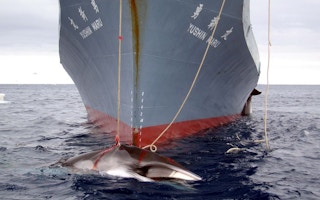Japan’s Southern Ocean “scientific” whaling program is contrary to international law, the International Court of Justice found last night after a four week trial between Australia and Japan in June last year.
In a series of majority rulings the ICJ found that Japan’s Southern Ocean whaling program (JARPA II) was contrary to international law, specifically Japan’s obligations under the International Convention on the Regulation of Whaling (the Whaling Convention).
The Court found that the special permits granted by Japan authorising their Southern Ocean whaling program (JARPA II) were not covered by the provisions of Article VIII of the Whaling Convention. Article VIII allows countries to issue special permits to allow the killing of whales for the purposes of scientific research.
The Court, therefore, decided that Japan must revoke the permits they have issued for JARPA II, and “…refrain from granting any further permits in pursuance of that program”. However there is nothing to stop Japan continuing whaling in the Northern Hemisphere (under its JARPN program), or reapply for a different scientific whaling program in the Southern Ocean.
“
The Court also found that Japan had breached its obligations with respect the moratorium on commercial whaling; the prohibition on whaling in the Southern Ocean Whale Sanctuary; and the ban on the use of factory ships in the Southern Ocean
Not scientific
The Court found that the JARPA II whaling program was not for the purposes of scientific research “…within the meaning of Article VIII” of the Whaling Convention. The Court, therefore, also found that Japan had breached its obligations with respect the moratorium on commercial whaling; the prohibition on whaling in the Southern Ocean Whale Sanctuary; and the ban on the use of factory ships in the Southern Ocean.
While the Court found that the killing of whales for scientific purposes “…per se is not unreasonable”, it judged that the scale of lethal sampling in JARPA II was not justified by the research objectives of the program, and “…not reasonable” in relation to achieving its objectives. Permits for killing 850 minke whales were issued as part of the program, but around 4,000 whales were taken in total.
The Court noted that the JARPA II Research Plan did not provide adequate justification for the number of minke, fin and humpback whales which were to be taken in the program. The judgement went on to say that there was “… some evidence [which] suggests that the program could have been adjusted to achieve a far smaller sample size, and Japan does not explain why this was not done”.
The Court also criticised JARPA II on the grounds that “… little attention was given to the possibility of using non-lethal research methods more extensively to achieve the JARPA II objectives”. The Court also criticised Japan for allowing “…funding considerations” (the income from the sale of whale meat), rather than scientific criteria, to influence the design of the JARPA II whaling program and its sample sizes.
All of these findings by the Court were made by a 12 to 4 majority ruling.
Early in the proceedings Japan had put forward an argument that the Court did not have jurisdiction to hear the case, but this was rejected by the Court in a unanimous decision.
Profound implications
The Court made no judgement on what was “scientific research” in this case. In week one of the trial in June last year, Australia made recommendations on standards for scientific whaling, but these weren’t accepted by the Court.
It also made no judgement in relation to whaling policy, noting that “… members of the international community hold divergent views about the appropriate policy towards whales and whaling, but it is not for the Court to settle these differences”.
Australia filed its application at the ICJ in May 2010, requesting the Court to declare that Japan is in breach of its international obligations under the International Convention for the Regulation of Whaling (ICRW). The case was heard in The Hague over four weeks in June 2013.
Judgements of the International Court of Justice are binding on the Parties to the case – there is no “higher court of appeal”. The ramifications of this judgement for the International Whaling Commission, established under the Whaling Convention, are profound.
Dr Tony Press is the CEO of the Antarctic Climate and Ecosystems Cooperative Research Centre based at the University of Tasmania. This post originally appeared in The Conversation.

















